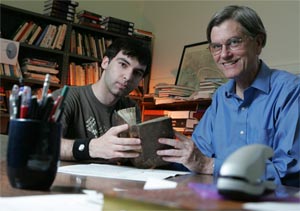 Alex Gendler ’06, a double major in English and philosophy, is the recipient of a Beinecke Scholarship, providing funding for graduate studies in the arts, humanities, and social sciences.
Alex Gendler ’06, a double major in English and philosophy, is the recipient of a Beinecke Scholarship, providing funding for graduate studies in the arts, humanities, and social sciences.
Gendler will receive $2,000 immediately and an additional $30,000 while attending graduate school. He’s the latest in a long list of recent Lafayette recipients of prestigious national and international scholarships and fellowships for undergraduate and post-graduate study. For information on applying for scholarships and fellowships, contact Julia A. Goldberg, assistant dean of studies, (610) 330-5521. See also the latest edition of Aristeia, which showcases the achievements and reflections of outstanding current and recent Lafayette students who represent the growing number of students at the College pursuing both academic excellence and engagement with civic life and social justice.
As one of 18 Beinecke recipients selected from 87 nominees, Gendler is in excellent company. Each year about 100 colleges and universities are invited to nominate one student each for the Beinecke award.
The Beinecke Scholarship program encourages and enables young men and women of exceptional promise to pursue opportunities available to them and to be courageous in the selection of a graduate course of study.A Lafayette Trustee Scholar from Elmwood Park, N.J., Gendler is currently serving as EXCEL research assistant to James Woolley, Frank Lee and Edna M. Smith Professor of English.
Gendler’s responsibilities include analyzing the variations among different versions of the poems of Jonathan Swift. The research is part of the Swift Poems Project, a long-term effort to produce a new critical edition and electronic archive of Swift’s poems. Woolley was awarded a Guggenheim Fellowship in support of the research.
In EXCEL, students conduct research with faculty while earning a stipend. The program has helped to make Lafayette a national leader in undergraduate research. Many of the more than 160 students who participate each year share their work through articles in academic journals and/or conference presentations.
Gendler is learning important lessons about the meanings of early texts.
“One of the essential questions posed in literary theory is, What is the relationship of the word to the text?” Gendler says. “With word changes, the meaning of the text changes and in extreme cases, the words have changed so much that they could be considered different texts – this research is a prime example of that.”
While few would argue that reproductions of Swift poems over the past 300 years have changed his poems so much that they are entirely new works, Woolley says, the project illustrates a fundamental lesson on texts of all kinds.
“They are unstable,” he says. “They are subject to revision, authorized and unauthorized, and to degradation, as copyists make inadvertent errors. Sometimes censorship also degrades a text. In this project we watch the revising or degradation take place and try to account for it.
“I would expect that from participating in this research, Alex will gain close familiarity with a body of major poetry, an acquaintance with scholarly editing as a centrally important type of humanities scholarship, and most broadly, a lively awareness of the instability of texts,” Woolley continues. “It is useful for persons in any walk of life to be conscious of the instability of texts, since the texts we depend on every day, from news broadcasts to email messages, are subject to manipulation, distortion, and fabrication, to say nothing of misinterpretation, even when the text itself is transmitted with 100 percent accuracy.”
Gendler is arts and entertainment editor of The Lafayette.
 Alex Gendler ’06, a double major in English and philosophy, is the recipient of a Beinecke Scholarship, providing funding for graduate studies in the arts, humanities, and social sciences.
Alex Gendler ’06, a double major in English and philosophy, is the recipient of a Beinecke Scholarship, providing funding for graduate studies in the arts, humanities, and social sciences.